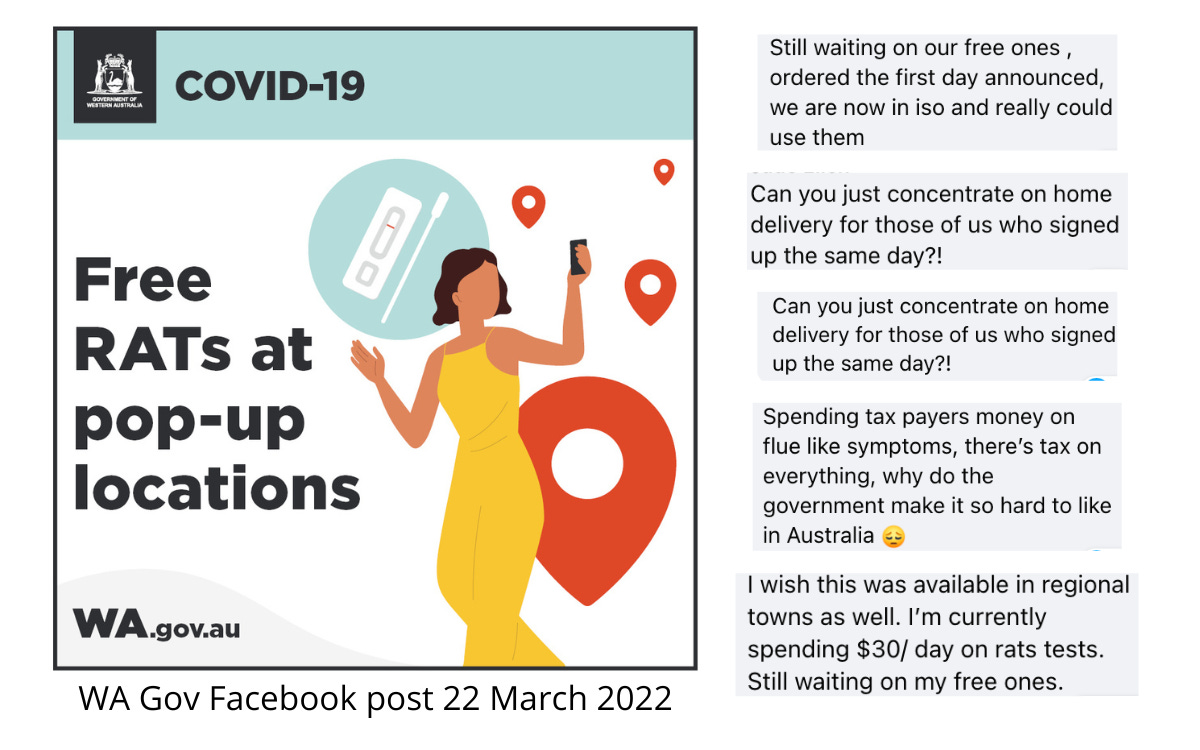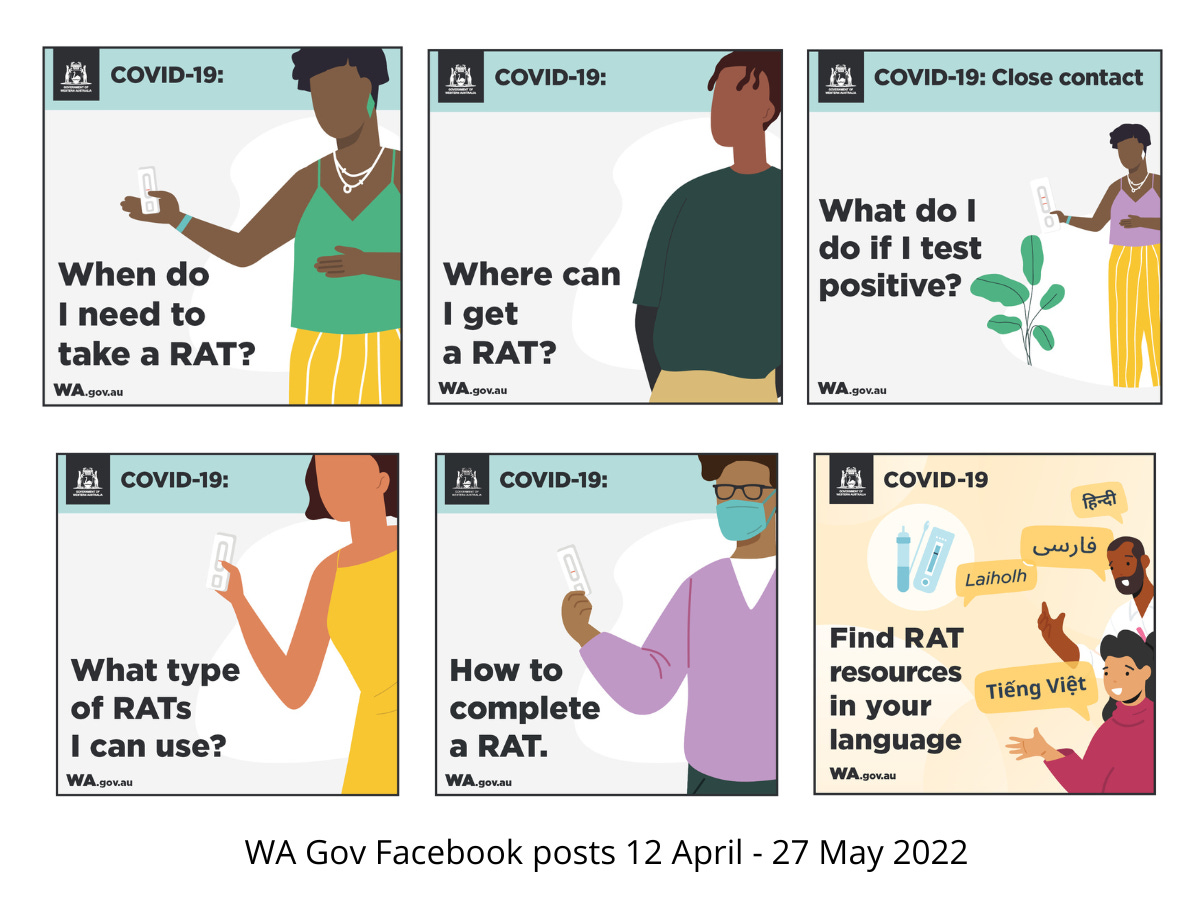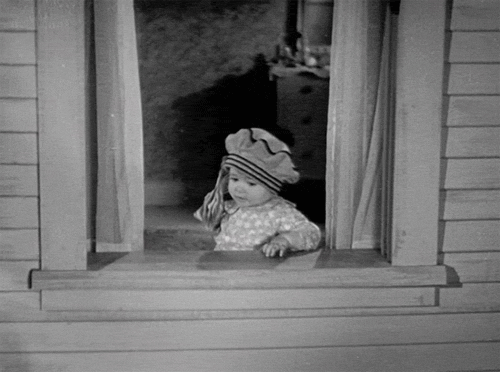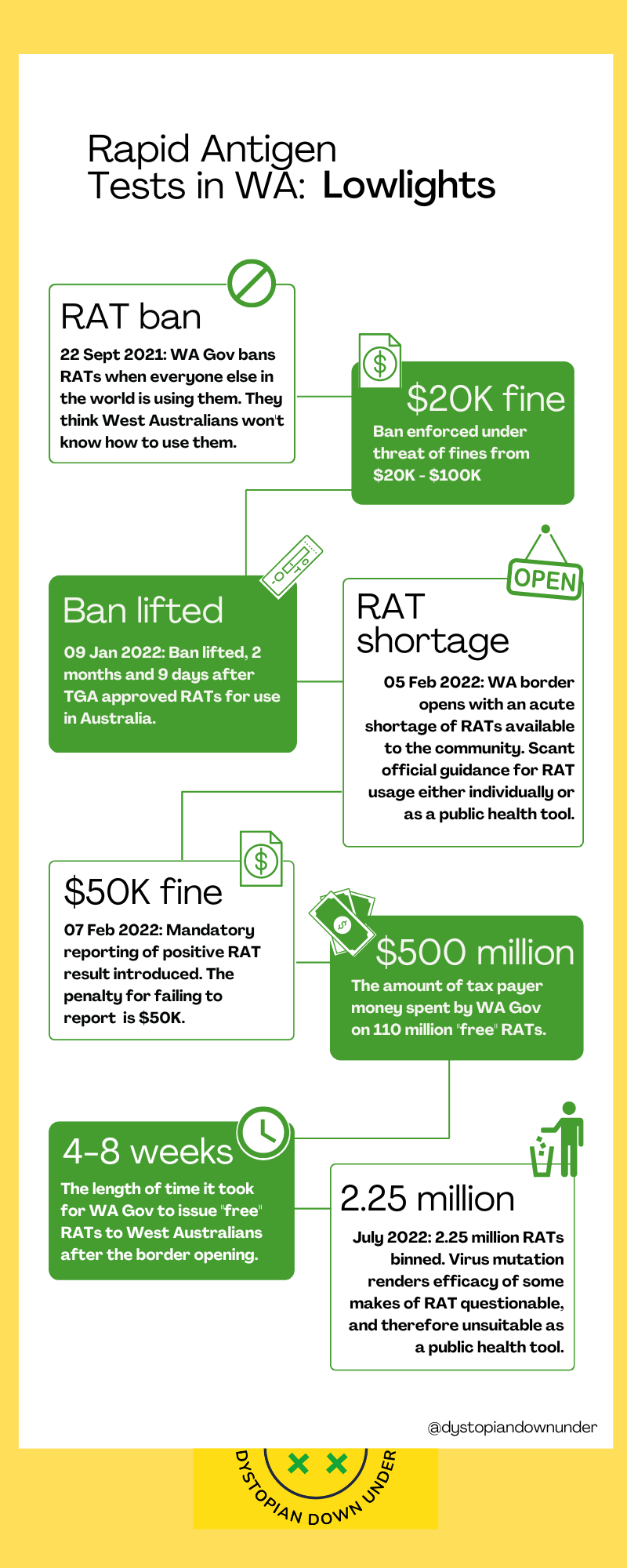Remember when the fine for possession of a RAT was $20, 000?
A trip down memory lane
In late 2021, Western Australia, the fine for getting caught with a rapid antigen test (RAT) for Covid was $20, 000. For companies caught selling one, the fine was $100, 000.
Chief Health Officer Dr Andrew Robertson signed the order into effect on 22 September 2021 to prevent West Australians from self-diagnosing Covid infection. At the time, the only way legal way to test for Covid was with a PCR administered at a government-approved site.
In December 2021, when RATs were legal and available in all states and territories except for South Australia and Western Australia, a letter from the WA health department revealed that the ban on RATs was still in place in case people “misinterpret the results”.
(Aside: this reminds me of the time earlier this year when Public Health Scotland stopped publishing Covid data because they felt that ‘anti-vaxxers’ would misinterpret it.)
The prohibition order stated that public use of RATs, “may adversely affect the prevention, control and abatement of the serious public health risk presented by COVID-19.”
WA Gov wanted to retain complete control of testing and case tracking.
A charitable view on this order would be that WA Gov believed that Covid was deadly and wanted to ensure that people did not mistakenly produce false negatives, only to go out into the community and kill all their friends and co-workers. A less charitable view would be that WA Gov has a tendency towards overreach, wresting agency from its citizens at any opportunity. There may be truth in both positions.
Whatever the reason, the threatened fines were extreme.
My personal interest in RATs was for family reasons. My partner’s sister has a double lung transplant and we were gravely concerned for her. On the advice of her doctors, she had all the vaccinations as soon as they became available. However, towards the end of 2021, it was obvious to me that the vaccines would not prevent her from getting infected with Covid, and so we were looking for additional prevention and treatment measures.
In late October 2021, I came across epidemiologist Michael Mina on an episode of Lex Fridman’s podcast (see Bonus Content at end of this post). Mina made a strong case for the use of RATs in slowing community spread of Covid. His argument was that, unlike PCRs, which test for miniscule amounts of virus particle in order to diagnose a Covid case at the level of the individual, RATs measure viral load to determine whether a person is infectious, and this serves to manage Covid spread at the level of community. In other words, RATs are less sensitive than PCR tests, they test for a different end point, and they perform a different function in public health strategy. They can be used to identify positive Covid cases, but this is not their best application – the reduced sensitivity of RATs compared to PCRs means that they are more likely to return false negatives for the end point of Covid positive or negative.
Mina also noted that RATs are cheap, anonymous, and fast. Mina said that accuracy is variable, as is the case with PCRs, but argued that the goal was not case by case accuracy, but slowing of spread at large-scale. He also gave an overview of the best use for slowing Covid spread, which involved widespread usage very early on in an outbreak – either at first detection of the virus in waste water, or at first reporting of a new case. Mina didn't comment on whether zero Covid is a desirable goal. He just said, if you want to slow spread, it makes sense to use these tests strategically at community scale.
The New York Times did a write-up from a similar angle in late 2020, in which Mina was featured. Various studies found that the combined affordability, accessibility and moderate reliability of RATs in determining infectiousness offered good enough results to warrant widespread use as a public health tool, especially where PCR testing was difficult to access or where the timeframe (sometimes 48 hours from test to result) was impractical. RATs also allowed for the shortening of the quarantine period from 14 days to ‘7 days or a negative RAT result’, as discussed in this study funded by the CDC (conducted in 2021 and published in April 2022).
Australian media touted RATs as an important line of defence in community spread, such as in this ABC article from November 2021. In an article for The Royal Australian College of General Practitioners, Professor Deborah Williamson (Doherty Institute, Royal Melbourne Hospital) stated that RATs could play a complementary role to PCR testing in our public health response to Covid. Noting that RATs can return a negative result when a person has Covid and are therefore not a gold standard diagnostic tool, Williamson contextualised this fact with emphasis on the RAT end point of viral load and infectiousness. Williamson highlighted that use of similar tests for HIV had been successful in Australia, due in part to, “education campaigns [to] help people understand the limitations of the test,” and, “effective processes in place to support people who return a positive result.”
Amusingly, when Elon Musk mistakenly tweeted that his RATs hadn’t worked for failing to identify that he was Covid positive, the internet did what it does best and corrected him with memes. Space Karen was swiftly informed how RATs work, and their intended use.
Having absorbed all of this information, I assumed that RATs would form an important part of the WA Gov public health strategy, and was keen to get my hands on some RATs as soon as possible. I knew they wouldn’t be 100% accurate, but I wanted to take every possible measure. Imagine my surprise when I discovered that, not only were RATs not available in WA, but it was an offence to be caught in possession of one. For context, the maximum fine for being caught with illicit drugs in Western Australia is $2, 000, which is 1/10 of the fine for being caught with a RAT. The maximum fine for supplying illicit drugs in Western Australia is $100, 000, the same amount that suppliers of RATs would be liable for if caught.
By the end of December 2021, mainstream media were calling for the ban on RATs to be lifted. An outbreak just before Christmas and the impending border opening triggered fears that, with the ban on RATs still in place, West Australians would be unable to access RATs as Covid started to spread in the community.
International media even picked up on the ban. The Daily Mail UK led with one of my favourite pandemic lines to date:
“Dinosaur health bureaucrats in two Australian states are continuing to add to Christmas Covid-despair with bans on rapid antigen testing kits for the general public.”
Come 09 January 2022, the ban was finally lifted, but now we had a new problem: supply. News feeds were flooded with reports of RAT shortages, with pharmacies being unable to secure stock until the very last minute. Australian Pharmacy Guild's WA branch president Andrew Ngeow expressed concern over the lack of guidance from WA Health on the use of RATs as a public health measure:
"What we'd like to be told is how [the tests are] going to be used, when [they are] going to be used, and what the patient should be doing [after] a positive or a negative test."
The WA border finally opened on 05 Feb 2022, and in one of its hardest pivots of the pandemic, WA Gov went from threatening $20,000 fines for having a RAT to $50, 000 fines for failing to register a positive RAT result. The mandatory registration requirement for RATs was announced on 07 February 2022 with the below caveat:
By the end of February 2022, WA Gov was advertising free RATs for every household. Many people, myself included, had already spent hundreds of dollars buying RATs online as soon as they could legally be shipped into the state. The free RATs were issued throughout March and April, a full 4-8 weeks after the WA border opened on 05 February 2022, and far too late in the game to be used in the way recommended by Mina, which required that RATs be used at first detection of Covid in the community, not several months into the spread. Comments on the WA Gov Facebook page indicated how their handling of RATs was going down in the community:
By mid-April, WA Gov finally addressed its greatest concern - that of West Australians not knowing how to properly use RATs. Turns out, all that was required was a cute collection of infographics. By this stage, the WA border had been open for 2 1/2 months.
Just like Space Karen, West Australians have widely trashed RATs as a failure due to returning negative results even though the person has symptoms, or when the person has tested positive with a PCR. This public confusion is symptomatic of WA Gov’s failure to properly differentiate between the function and purpose of RATs and PCR tests in its public health implementation and messaging. Bizarrely, the Australian federal government and other state governments also took the same tack. It might sound like a small difference in meaning, but in practice the implications were substantial.
The framing of RATs as a diagnostic tool for Covid infection (interchangeable with PCR testing) has led to many users of the tests to believe that the tests are rubbish and don’t work. Users with Covid symptoms may test negative for three days before testing positive on the fourth day, which is then interpreted as a failure of the first three tests to pick up Covid infection. Or, users may test negative with a RAT in the morning before receiving a positive PCR result that evening. Again, this is typically interpreted as the failure of the RAT to properly diagnose Covid. The perceived failure of RATs in individual diagnosis of Covid infection, which is not their intended public health use, undermines trust in both the tests and in the government pandemic response. By neglecting to implement RATs in a strategic manner according to the recommendations of international and Australian leading experts, WA Gov ensured that the public health value of the tests was minimal.
As it turns out, the use value of RATs does become increasingly questionable as variants mutate. RATs designed to pick up virus particles for earlier variants may fail to pick up variants that didn’t exist at the time of manufacture. This preprint study from January 2022 was one of the earlier sources to flag the issue. From a small study group of 30 people, the authors found that most Omicron cases were infectious for several days before being detectable by a RAT.
By July 2022, just last week, WA Health had to admit to the wastage of 2.25 million non-compliant RATs. Though compliant at the time of purchase, the RATs have now been removed from the list of TGA approved tests and are no longer thought by the regulator to be effective. WA Gov spent half a billion dollars on 110 million RATs. Assuming price parity across all brands purchased, these 2.25 million RATs cost tax payers just over one million dollars.
At this point in the timeline, it seems as though the promise of rapid antigen tests has turned out to be a net loss - for the taxpayer purse, for the reputation of WA Gov, and for controlling spread early in the piece, when RATs would have been useful.
But the losses incurred to the average West Australian have lined the pockets of a select few who profited enormously from the RAT fiasco. Perth couple Matthew James Fry and Anna Katarzyna Fry made the news in May for their purchase of a $16.5 million riverfront home. Mr Fry’s company AM Diagnostics was one of the first Australian companies to secure TGA approval for supply of RATs in Australia. The Australian Financial Review reported on entrepeneurs making big bucks on RAT contracts, including David Panton, owner of Pantonic Health and partner at the time (now ex) of former Foreign Minister and Perth resident, Julie Bishop.
And so, WA Gov undermined trust in its government and associated health agencies due to its handling of the RAT fiasco in WA. Worse, they missed their opportunity to slow community spread by failing to implement strategic use of RATs as a public health tool, as they are intended.
If there’s one big learning for me from this trip down memory lane, it is that our behemoth, overreaching governments and their clunky departments are simply not equipped to handle issues as important as public health. Their interference so often worsens the problem and confounds private citizens in their pursuit of solutions. Our governments are bulging administrative waste machines. There is a lot to improve upon, but I think it would be a very good start if WA Gov and other state governments might back off from legislating their constituents into permanent and enforced infantilisation. Fewer fines, less nannying. More transparency. And smaller departments so that they might respond with agility to new information as it arises. Our health and lives depend on it.
BONUS CONTENT
Watch Lex Fridman interview Michael Mina on Rapid Covid Testing













This fakedemic only revealed how most of our elected politicians are bureaucrats are nothing but petty tyrants in disguise.
You're like us here in NZ, in that your CHO is a military guy.